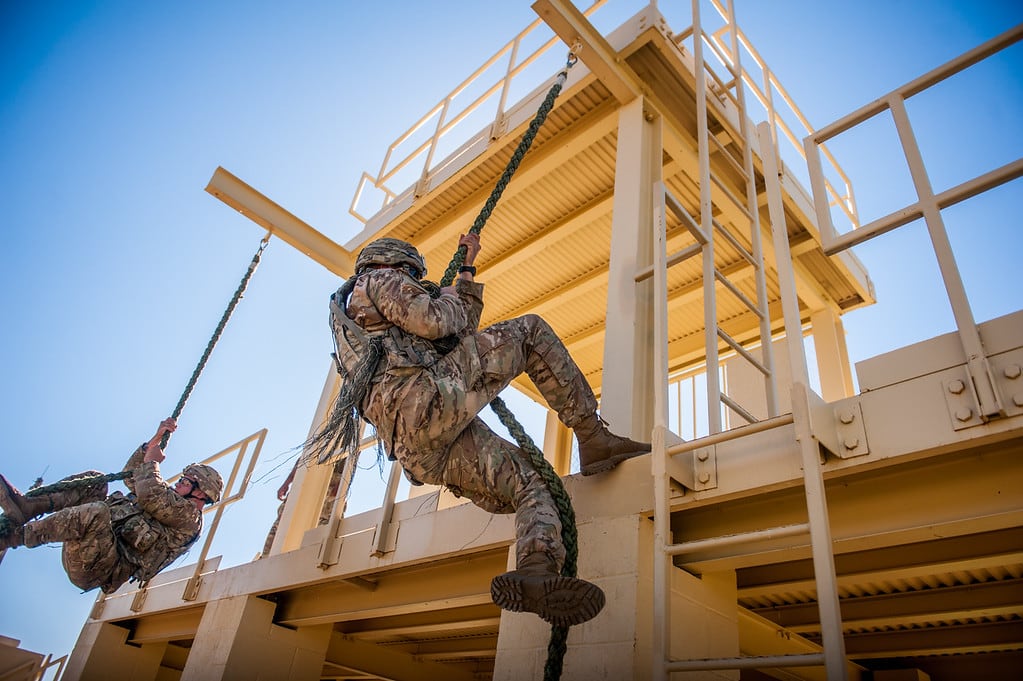FORT BENNING, Ga. — Retired Command Sgt. Maj. Joe Gainey spent 33 years as a cavalry scout and capped his career as the first senior enlisted adviser to the chairman of the Joint Chiefs of Staff.
But that's not all. Gainey also has an international cavalry scout competition named after him.
Gainey, 60, was on hand at Fort Benning on Monday to help kick off the third biennial Gainey Cup, a competition that pits 24 six-man scout squads from around the Army and the world against each other to find the best.
Standing beside a training range after an exhibition of helicopter fast-roping, armored vehicle live-fire and mortar launching, Gainey said he had to remind himself it was just a show.
"Imagine the tanks shooting, the Bradleys shooting, the Apaches. shooting all at the same time, the mortars shooting, the artillery shooting. It's like nothing else. All you think about is getting through it," he said of combat. "When the tank first went off, I jumped. But then I closed my eyes and I said, 'I know where I'm at, I'm doing okay.'"
It's a technique the Balkans and Iraq war veteran uses often, he said.
"When you see that he or you or someone else is in danger, in your brain, a button clicks on. It's called survival. The minute it's over, it clicks off. You know you're okay," he explained. "When you hear something like this, you click off. I tell my soldiers to remember that when you go over some place and fight, if you bring it home with you and let it control you, they have won."
The Gainey Cup
"Best" competitions are not rare in the Army — there's one for Rangers, one for medics, one for Sappers, one for snipers. But until 2013, there was never one for cavalry scouts, a combat military occupational specialty that has seen multiple Medal of Honor recipients.
"They never even thought about a scout competition," Gainey said of his time on active duty, from 1975 to 2008. "It shocked me when they came up with it."
When it came time to name the competition, Gainey was one of five candidates, he added. And when he got the notification phone call, he insisted they name it after one of the other four scouts.
"I've had a great military career. I'm okay, I'm happy," Gainey recalled. "They said, 'Congratulations, you won by default.'"
Fort Benning held the first Gainey Cup competition in 2013, he said, but he was less than impressed at the time.
"I remember thinking, 'This is is a gentleman's course. They're being bussed everywhere.' I sat down with the leadership and said, 'No. It's got to be hard, they've got to be hungry, they've got to be tired,'" he said. "When it was storming today, I came out here and stood in the rain with them."
The Monday rain brought with it a tornado, but it didn't slow the competition, according to the head of the Army's reconnaissance and armor training.
"It didn't affect the event at all, other than the participants at some point had to take cover under a hard structure," said Col. Thomas Feltey, head of the 316th Cavalry Brigade.
The four-day event includes multiple live-fire events, obstacles courses, communications tests and a stress shoot — where soldiers have to complete an obstacle course with their rifles on their backs, then head into a tower to take out targets on a range.
The participants are the winners of individual unit competitions back home, Feltey said, and the ultimate "Best Scouts" will return home with bragging rights and a great case for promotion.
Among them are 17 active duty squads, three from the National Guard, two from Canada, one from the United Kingdom and another from the Netherlands, he added.
The third Gainey Cup will name its winners on Thursday. The man for whom its named is looking forward to some big changes in the future.
"You know what I'm waiting on? I'm waiting on my first female scout to come out here," he said. "They had the first lieutenant tanker out here a while ago, and I shook her hand and said, 'Welcome to my team. Welcome to my family. Don't worry about being the first, just don't be the last.'"
Meghann Myers is the Pentagon bureau chief at Military Times. She covers operations, policy, personnel, leadership and other issues affecting service members.




